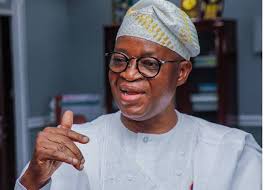The Minister of Marine and Blue Economy, Mr. Adegboyega Oyetola, has pledged to significantly reduce Nigeria’s heavy dependence on fish imports by increasing local production through expanded aquaculture, modernised artisanal fishing, and the establishment of fish farming clusters nationwide.
In a statement issued on Thursday, Oyetola stressed that Nigeria has the capacity to meet its fish demand locally and must take bold steps to stop importing what can be produced within the country. “We cannot continue to import what we have the capacity to produce locally,” he said. “We are aggressively boosting local fish production by supporting aquaculture development, improving artisanal fishing methods, and expanding fish farming clusters across the country. This will not only save our foreign exchange but will create thousands of jobs for our people, especially in coastal and riverine communities.”
The minister noted that the new drive to increase domestic fish production would also focus on empowering youth and women in the sector. He explained that their active participation was vital for sustainable and inclusive growth in the marine economy. “We are designing initiatives that will give our young people and women the tools, skills, and access they need to play leading roles in the marine economy. This is not just about economic growth; it’s about social empowerment and equitable development,” Oyetola added.
Oyetola’s announcement comes shortly after the Federal Executive Council approved the National Policy on Marine and Blue Economy, which he described as a “historic first” for Nigeria. According to him, the policy provides a comprehensive framework for the sustainable exploitation, conservation, and governance of Nigeria’s marine and coastal assets. “It will drive wealth creation, generate jobs, enhance food security, and position Nigeria as a leader in Africa’s emerging blue economy space,” he said.
The minister stated that Nigeria is now “on the right path to unlocking the immense economic opportunities” from its oceans, seas, rivers, and coastal resources, emphasising that a well-structured marine economy would be a vital pillar for the country’s economic diversification and environmental sustainability goals.
International partners have also shown support for the new policy direction. A World Bank team led by Ms. Gladys Fajomu commended Oyetola for his leadership and Nigeria’s bold steps in advancing the marine and blue economy agenda. “We will continue to support Nigeria through technical assistance, capacity building, and financing options for strategic projects,” Fajomu assured.
The visiting team, which included Ms. Yolanda Monteo and Dr. Felicia Mogo, met with senior officials of the Ministry of Marine and Blue Economy to discuss areas of collaboration. The talks focused on policy implementation, infrastructure development, and encouraging private sector involvement to scale up investment in marine and coastal industries.
With the new initiatives, the ministry aims to create a more vibrant and sustainable fishing industry, reduce Nigeria’s import bill on seafood, and strengthen the value chain in aquaculture and marine products. The focus on fish farming clusters and improved artisanal fishing techniques is expected to create jobs, increase exports, and provide healthier protein options for Nigerian households.
Oyetola reaffirmed that his ministry’s plans were not only aimed at boosting economic growth but also at promoting inclusive development that ensures vulnerable communities benefit from the country’s marine resources. He expressed confidence that with strong collaboration from stakeholders, including international partners like the World Bank, Nigeria would become a major player in Africa’s fast-growing blue economy sector.
